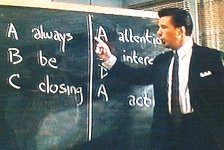The “I Work For You” Sales Technique

Would you buy a car from this man? Maybe and maybe not!
In a recent survey asking people what occupations are trusted, the last three on the list were Lawyers, Advertising Practitioners and Car Salesman, in that order. As an Advertising Practitioner myself, it’s always a challenge building credibility with new contacts as well as maintaining trusted relationships with existing customers.
It’s assumed that customers want a high level or professionalism from their salespeople. They demand superior product knowledge and a high degree of integrity. That being said, some of your customers may simply be looking for a GOOD DEAL or what they perceive to be a good deal. You could be the most polished and professional sales person and still not get the order if the client thinks you are working for YOUR interests not for THEIR interests.
Success on the Car Lot
Successful new and used car salesman sell more cars when they convince potential customers that they are doing whatever it is possible to get the customer a good deal or the BEST DEAL.
We’ll call this the “I work for you” technique.
We’ve all seen ads where the store announces proudly ‘our salespeople are NOT on commission’ or ‘no pushy salespeople’. The basic strategy behind the idea of “I work for you” is the direct opposite.
Here’s how it works.
The first thing to do is let the prospect know that you are on commission and any business transaction you do is important and directly effects how much money you take home each week.
Second, once you’ve identified yourself as someone who has a vested interest in the transaction, make sure the prospect knows the YOU KNOW how business gets done. You are their ‘agent’ and will be looking out for them during the negotiation. You plan to help them navigate the waters of the transaction and it’s your job to kick the crap out of the supplier (your company) and get your customer the best deal possible.
You must convince the customer you are:
- Extremely knowledgeable about the details of the transaction including how price, delivery, credit and discounts are negotiated
- A master at negotiating with your Sales Manager or whoever you need to talk to and ‘clear the deal’
- Somewhat ‘crafty’ in your ability to work the numbers and constantly come back with solutions
- A 100% bonified ‘killer in their corner’
- Telling the truth even when the news is bad. For example, what you perceive as deal breaker information like ‘this car was in an accident’ might be something that your prospect recognizes as an opportunity. The may want to do the deal more! Remember, prospects and customers are not looking for perfection from their suppliers, they are looking for people who will keep their best interests (getting a good deal) in mind.
If a customers truly believes that you are acting in their best interest, they will be more flexible and often more agreeable to you. If you have demonstrated to the prospect that you are willing to go back in ‘round after round’ and keep slugging until the deal is done, the may be less likely to walk when you come back to the corner saying ‘no mas’.
So the next time you are up against a tough prospect, try dropping some of the sophistication and applying a little hair gel…you might be surprised how they react when they know they have someone just as crafty as they are doing the deal for them!
Mitch Drew

Just for fun, visit my favourite car saleman Josh Towbin aka THE KING OF CARS.






